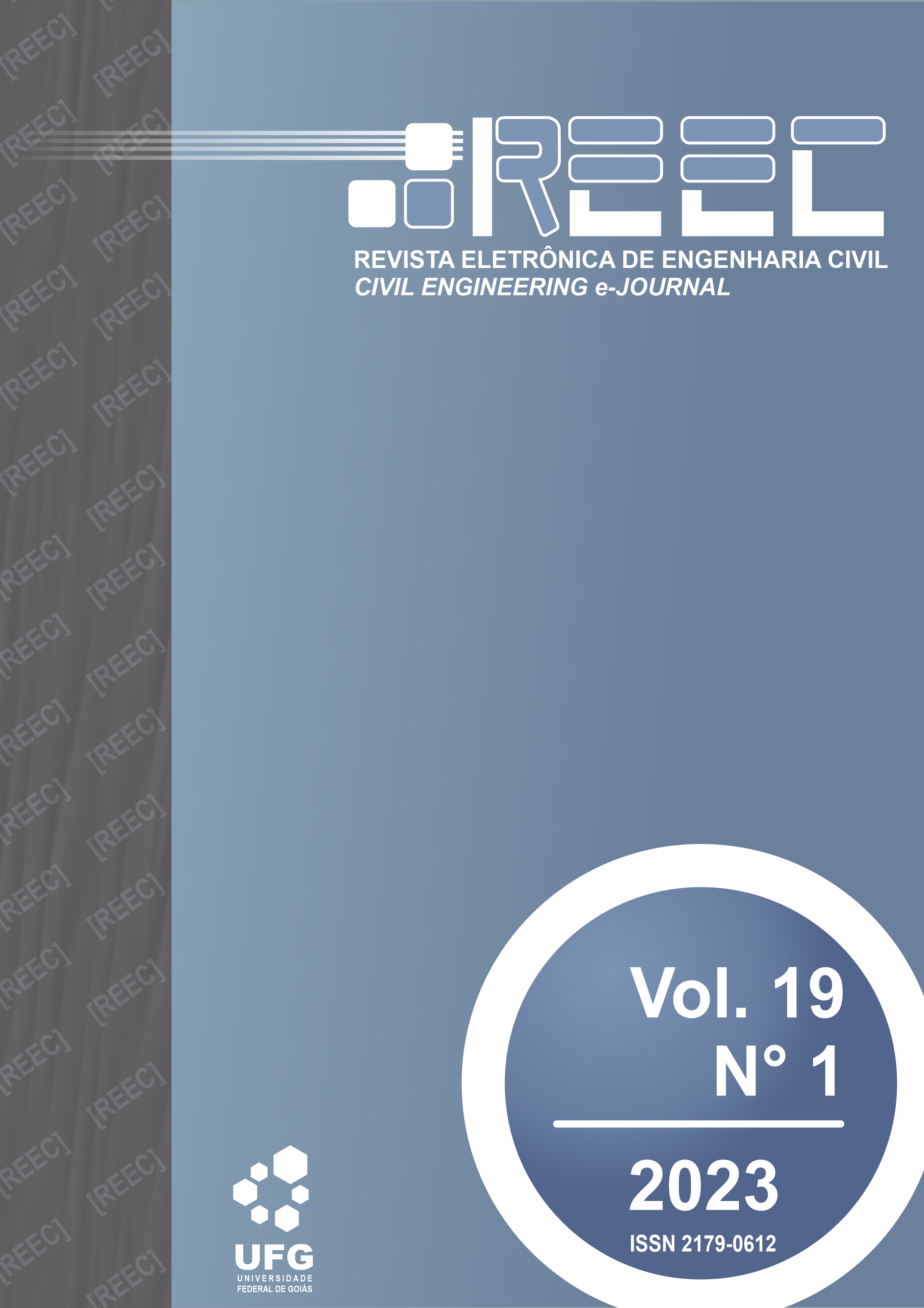AVALIAÇÃO DO COMPORTAMENTO REOLÓGICO DAS MATRIZES CIMENTÍCIAS COM A ADIÇÃO DE NANOTUBOS DE CARBONO: UMA REVISÃO SISTEMÁTICA DA LITERATURA (RSL) – PARTE 1
DOI:
https://doi.org/10.5216/reec.v19i1.76626Palavras-chave:
Reologia, Tensão de escoamento, Taxa de cisalhamento, Matriz cimentícia, Nanotubo de carbonoResumo
RESUMO: A reologia do concreto afeta seu processo de mistura, manuseio, transporte, bombeamento, moldagem, adensamento, acabamento e qualidade da superfície após o endurecimento. A incorporação de nanomateriais nos compósitos cimentícios, como os nanotubos de carbono (NTC), pode influenciar os parâmetros do estado fresco. Contudo, ainda existem poucos trabalhos e uma grande variedade de resultados envolvendo parâmetros reológicos de matrizes cimentícias reforçadas com NTC. Este artigo visa levantar os principais parâmetros reológicos de matrizes cimentícias incorporadas com NTC através de uma revisão sistemática da literatura (Parte 1). Os dados bibliométricos foram apresentados na Parte 2. Compreender como os diferentes componentes e aditivos interagem e influenciam o comportamento reológico permite a criação de matrizes com propriedades avançadas. Muitos estudos mostraram que a tensão de escoamento e a viscosidade dos compósitos cimentícios com NTC mostraram uma tendência linear na primeira hora de hidratação. Ainda, o reforço com NTC aumentou gradativamente a tensão de escoamento e a viscosidade das pastas de cimento em parte das pesquisas. Isso se deve, principalmente, à alta superfície específica do NTC. Ao mesmo tempo, outros autores apontaram esse efeito ser reduzido ou até anulado através do uso de aditivos superplastificantes, como concretos autonivelantes, argamassas de alta aderência e materiais de reparo com características específicas.
Downloads
Referências
ANDRADE NETO J.S., SANTOS T.A., PINTO S.A., DIAS C.M.R., RIBEIRO D.V. Effect of the combined use of carbon nanotubes (CNT) and metakaolin on the properties of cementitious matrices. Construction & Building Materials. Vol. 271. 2021.
AZEVEDO, N.H.; MATOS, P.R.; GLEIZE, P.J.P.; BETIOLI, A.M. Effect of thermal treatment of SiC nanowhiskers on rheological, hydration, mechanical and microstructure properties of Portland cement pastes. Cement and Concrete Composites, v.117, 2021.
DRESCH, A.; LACERDA, D. P.; ANTUNES JUNIOR, J. A. V. Design Science research: método de pesquisa para avanço da ciência e tecnologia. Porto Alegre: Bookman, 2015.
FAROOQ F., AKBAR A., KHUSHNOOD R.A., MUHAMMAD W.L.B., REHMAN S.K.U., JAVED M.F. Experimental investigation of hybrid carbon nanotubes and graphite nanoplatelets on rheology, shrinkage, mechanical, and microstructure of SCCM. Materials. Vol. 13, n. 230. 2020.
GLEIZE, P. J. P. Nanotecnologia e Materiais de Construção. In: Materiais de construção civil e princípios de ciência e engenharia de materiais. Volume 2. 2. ed. São Paulo: IBRACON, 2010. 1719–1745 p.
JIANG S., SHAN B., OUYANG J., ZHANG W., YU X., LI P., HAN B. Rheological properties of cementitious composites with nano/fiber fillers. Construction & Building Materials. Vol. 158. p. 786 – 800. 2018.
JIAO, D.; SHI, C.; YUAN, Q. Influences of shear-mixing rate and fly ash on rheological behavior of cement pastes under continuous mixing. Construction and Building Materials, v. 188. 2018. 170-177 p.
KIM J.-H., CHOI I.-J., CHUNG C.-W. Dispersion of single wall carbon nanotube using air entraining agent and its application to portland cement paste. Construction & Building Materials. Vol. 302. 2021.
KOSTRZANOWSKA-SIEDLARZ, A. Statistical methods for determining rheological parameters of mortars modified with multi-walled carbon nanotubes. Construction & Building Materials. Vol. 253. 2020.
LEONAVIČIUS D., PUNDIENĖ I., GIRSKAS G., PRANCKEVIČIENĖ J., KLIGYS M., KAIRYTĖ A. The effect of multi-walled carbon nanotubes on the rheological properties and hydration process of cement pastes. Construction & Building Materials. Vol. 189, p. 947-954. 2018.
MA S., QIAN Y., KAWASHIMA S. Performance-based study on the rheological and hardened properties of blended cement mortars incorporating palygorskite clays and carbon nanotubes. Construction & Building Materials. Vol. 171, p. 663-671. 2018.
MACHADO, J.C.V. Reologia e escoamento de fluidos. Rio de Janeiro: Interciência, 2002. 257 p.
MACLEOD A.J.N., FEHERVARI A., GATES W.P., GARCEZ E.O., ALDRIDGE L.P., COLLINS F. Enhancing fresh properties and strength of concrete with a pre-dispersed carbon nanotube liquid admixture. Construction & Building Materials. Vol. 248. 2020.
MARCONDES, C. G. N.; MEDEIROS, M. H. F.; MARQUES FILHO, J.; HELENE, P. Nanotubos de carbono em concreto de cimento portland: Influência da dispersão nas propriedades mecânicas e na absorção de água. Alconpat, v. 5, n. 2. Maio-Agosto, 96-113, 2015 p.
PAULA J.N., CALIXTO J.M., LADEIRA L.O., LUDVIG P., SOUZA T.C.C., ROCHA J.M., MELO A.A.V. Mechanical and rheological behavior of oil-well cement slurries produced with clinker containing carbon nanotubes. Journal of Petroleum Science & Engineering. Vol. 122. 2014. 274-279 p.
REALES O.A.M., DUDA P., TOLEDO FILHO R.D. Effect of a carbon nanotube/surfactant aqueous dispersion on the rheological and mechanical properties of portland cement pastes. Journal of Materials in Civil Engineering. Vol. 30, n 10. 2018.
REALES O.A.M., JARAMILLO Y.P.A., BOTERO J.C.O., DELGADO C.A., QUINTERO J.H., TOLEDO FILHO R.D. Influence of MWCNT/surfactant dispersions on the rheology of Portland cement pastes. Cement and Concrete Research. Vol. 107,. 2018. 101-109 p.
REIS, J. F. A. Determinação de Parâmetros Reológicos de Concretos Através do Ensaio de Abatimento de Tronco de Cone Modificado: Estudo de Caso. Dissertação (Mestrado em Engenharia Mecânica) – Faculdade de Engenharia de Ilha Solteira, Universidade Estadual Paulista, Ilha Solteira, 2008, 179 p.
ROUSSEL, N. Understanding the rheology of concrete. Woodhead Publishing, 2012.
SILVESTRO, L. Incorporação de nanotubos de carbono funcionalizados com silano em pastas de cimento Portland. Tese. Programa de Pós-Graduação em Engenharia Civil. Universidade Federal de Santa Catarina. Florianópolis, 2022a, 190 p.
SILVESTRO L., LIMA G.T. S., RUVIARO A.S., MEZALIRA D.Z., GLEIZE P.J.P. Effect of Multiwalled Carbon Nanotube Functionalization with 3-Aminopropyltriethoxysilane on the Rheology and Early-Age Hydration of Portland Cement Pastes. Journal of Materials in Civil Engineering. Vol. 34. 2022b.
SILVESTRO L., LIMA G.T. S., RUVIARO A.S., MATOS P.R., MEZALIRA D.Z., GLEIZE P.J.P. Evaluation of different organosilanes on multi-walled carbon nanotubes functionalization for application in cementitious composites. Journal of Materials in Civil Engineering. Vol. 51. 2022c.
SILVESTRO L., RUVIARO A.S., LIMA G.T. S., MATOS P.R., AZEVEDO A.R.G, MONTEIRO S.N., GLEIZE P.J.P. Influence of ultrasonication of functionalized carbon nanotubes on the rheology, hydration, and compressive strength of portland cement pastes. Materials. Vol. 14. 2021.
SOLÍS R. G.; MORENO E. I.; ARJONA E. Resistencia de concreto con agregado de alta absorción y baja relación a/c. Alconpat, v. 2, n. 1, Janeiro-Abril, 21–29, 2012 p.
SOUZA T.C.C., PINTO G., CRUZ V.S., MOURA M., LADEIRA L.O., CALIXTO J.M. Evaluation of the rheological behavior, hydration process, and mechanical strength of Portland cement pastes produced with carbon nanotubes synthesized directly on clinker. Construction & Building Materials. 2020.
SKRIPKIUNAS G., KARPOVA E., BENDORAITIENE J., BARAUSKAS I. Rheological properties and flow behaviour of cement-based materials modified by carbon nanotubes and plasticising admixtures. Fluids. Vol. 5. 2020.
SKRIPKIUNAS G., KARPOVA E., BARAUSKAS I., BENDORAITIENE J., YAKOVLEV G. Rheological properties of cement pastes with multiwalled carbon nanotubes. Advances in Materials Science and Engineering. 2018. 13 p.
SKRIPKIUNAS G., YAKOVLEV G., KARPOVA E. The investigation of multi-walled carbon nanotubes dispersion and its influence on rheological properties of cement systems. MATEC Web of Conferences. 6º IPICSE. Vol. 251. 2018. Outubro. Moscow, Russia.
YAHIA, A.; MANTELLATO, S.; FLATT, R.J. Concrete rheology: A basis for understanding chemical admixtures, in: P.C. Aïtcin, R.J. Flatt (Eds.), Science and Technology of Concrete Admixtures, Elsevier, Woodhead Publishing Series in Civil and Structural Engineering. 2016. 97-127 p.
ZHANG J., QIU J., SHEN J., ZHANG M., JI H., YANG R. On the early behavior and microstructure of oil well cement paste incorporating with carbon nanotubes cured at a high temperature. Construction & Building Materials. Vol. 317. 2022.
Downloads
Publicado
Como Citar
Edição
Seção
Licença
Autores que publicam nesta revista concordam com os seguintes termos: Autores mantém os direitos autorais e concedem à revista o direito de primeira publicação, com o trabalho simultaneamente licenciado sob a Licença Creative Commons Attribution que permite o compartilhamento do trabalho com reconhecimento da autoria e publicação inicial nesta revista.
![[REEC] Revista Eletrônica de Engenharia Civil](https://revistas.ufg.br/public/journals/30/pageHeaderLogoImage_pt_BR.png)



